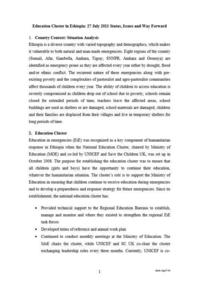Resources
Request support on coordination, information management, capacity development or other education in emergencies areas.
Demande de soutien en coordination, gestion de l’information, développement des capacités et autres domaines de l'éducation en situation d'urgence.
لطلب الدعم في مجال التنسيق ، إدارة المعلومات ، تنمية القدرات أو في اي مجال من مجالات التعليم في مناطق الطوارئ
Solicitar apoyo en coordinación, gestión de la información, desarrollo de capacidades u otra áreas en educación en emergencias.
Featured Resources
below you can find selected tools

COVID-19 Resources
View resources to support education in emergencies coordination during the COVID-19 pandemic.

Guidance on Education Cluster Co-Leadership Arrangements at the Country Level
Indicative Guidance for the establishment and management of co-leadership arrangements at the country level.

Inter-agency Network for Education in Emergencies
For technical education in emergencies resources, please visit the INEE website.
Pakistan MIRA Code of Conduct Agreement
This code of conduct provides basic standards in relation to interviewing and documenting information as part of the Multi-cluster Initial Rapid Assessment (MIRA) of the areas where disaster occurs in Pakistan. The principles laid down in this code of conduct are to safeguard the best interests of…
- Coordination: Needs Assessment
- Emergency: Floods
- HPC: Needs Assessment & Analysis
How to Approach a Dataset: Part1 - Database Design
his technical note provides guidance in how to set up a simple database suitable for storing small amounts of data as may be generated by a rapid assessment with relatively small sample sizes.It is aimed at supporting non-specialists in information management with a working knowledge of spreadsheet…
- Coordination: Needs Assessment, Information Management
- HPC: Implementation & Monitoring, Needs Assessment & Analysis
Compared to what: Analytical Thinking and Needs Assessment
This technical brief is based on three years of experience in analysing needs in emergency settings. It is the first of three ACAPS documents on the analysis of humanitarian needs. Readers are advised to complement this reading with the technical brief How Sure Are You?which explores how to judge…
- Coordination: Needs Assessment, Information Management
- HPC: Needs Assessment & Analysis
Building an Effective Assessment Team
The purpose of this document is to provide team composition definitions and descriptions of the functions that need to be filled in to perform a joint rapid assessment in the first weeks of a disaster. This technical brief is designed to guide the first steps of assembling an assessment team,…
- Coordination: Needs Assessment
- HPC: Needs Assessment & Analysis
The Child Friendly Community Assessment Tools: A Facilitator’s Guide to the Local Assessment of Children’s Rights
This guidebook describes a detailed step-by-step process for broadly assessing and monitoring children’s living conditions in communities of cities and towns of different sizes as well as in rural communitie. The assessment process outlined in the guidebook enables the collection of community level…
- Coordination: Needs Assessment
- HPC: Needs Assessment & Analysis
- Technical Areas: Protection
Ethiopia Cluster: Status, Issues and Way Forward
This report summarises the situation the Education Cluster in Ethiopia was facing in 2011 and identifies challenges as well as opportunities the cluster faced in responding to the education crisis.
- Coordination: Knowledge Mangement
- Emergency: Conflict, Complex, Drought, Floods
- HPC: Operational Peer Review and Evaluation
Education Cluster in Pakistan: Lessons Learned Flood Response
The Global Education Cluster commissioned a lessons learned exercise covering the period from the start of the floods in July until March 2010. This report outlines the main findings from this review and highlights a number of recommendations
- Coordination: Knowledge Mangement
- Emergency: Floods
- HPC: Operational Peer Review and Evaluation
Pakistan Assessment Working Group Terms of Reference
In order to further strengthen the inter-cluster coordination on assessments, the ICCM requested OCHA to establish an Assessment Working Group (AWG). The group was composed of cluster and agency needs assessment representatives and/or experts. OCHA chaired the Assessment Working Group and this…
- Coordination: Cluster Management, Needs Assessment
- Emergency: Floods
- HPC: Needs Assessment & Analysis
Ethiopia Education Cluster School Level Questionnaire
Ethiopia Education Cluster's Rapid Belg Assessment Form–School level
- Coordination: Needs Assessment
- Emergency: Drought
- HPC: Needs Assessment & Analysis
Filter results
Coordination(selected )
Country(selected )
Emergency(selected )
Humanitarian Programme Cycle(selected )
Language(selected )
Publication Date(selected )
Publisher(selected )
Resource Type(selected )
Technical Areas(selected )
Can’t find what you’re looking for?
Contact your relevant language Help Desk









